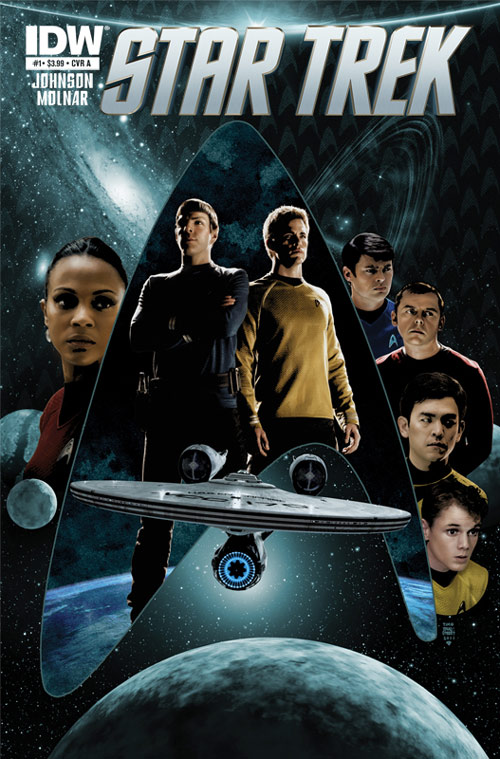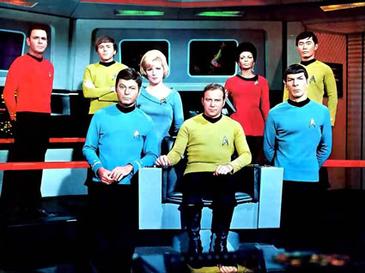Star Trek Into Darkness seems well on its way to box office success. I'm not surprise. Since J.J. Abrams took over the franchise reigns, he and his collaborators (Damon Lindelof, Roberto Orci and Alex Klurtzman) have deftly managed to stop the franchise's decline.
 Of course, as is the way of modern media, a comic book series continuing the movie universe continuity has been a big success. Like many film and tv series, Star Trek has used an ongoing comic to "continue the story" for diehard fans. Arguably more engaging than other efforts, the producers of the film are using the comic book series to retell classic stories. Indeed, any fan of the comic series already read "Where No Man Has Gone Before," the Gary Mitchell centric storyline that was focus of speculation as the inspiration for Star Trek Into Darkness. The producers are using the comic book to keep interest high among diehard fans, rewarding them with insight to the new trek universe. At the same time they are providing a steady stream of new material for fans of the film who might want more at a fraction of the costs associated with a television show. They are making use of comics to help the overall franchise.
Of course, as is the way of modern media, a comic book series continuing the movie universe continuity has been a big success. Like many film and tv series, Star Trek has used an ongoing comic to "continue the story" for diehard fans. Arguably more engaging than other efforts, the producers of the film are using the comic book series to retell classic stories. Indeed, any fan of the comic series already read "Where No Man Has Gone Before," the Gary Mitchell centric storyline that was focus of speculation as the inspiration for Star Trek Into Darkness. The producers are using the comic book to keep interest high among diehard fans, rewarding them with insight to the new trek universe. At the same time they are providing a steady stream of new material for fans of the film who might want more at a fraction of the costs associated with a television show. They are making use of comics to help the overall franchise.Still, as enjoyable as this reboot has been, I'm worry about the new Star Trek. A shocking statement, but one rooted in the cultural values attached to Star Trek as a tool to inspire. It is a hard argument to make given the financial success of the reboot. If not for Abrams' effort, it is unclear new Star Trek would be on any screen. Moreover, Abrams has made Star Trek accessible for those legion of fans that grew us fixated on Star Wars. At some level, that point explains my concerns.
While the original Star Trek series might have been pitched as Wagon Train in space, that program also provided a forum for a cadre of well respected science fiction writers to bring great stories to television.
 |
LIFE March 21, 1969 |
The results were compelling speculative fiction as much as adventure in the first two season. By the third season sliding rating and budget cuts undermined the show. Regardless, the original series inspired a devoted following based on complex morality and science fiction adventures. The original Star Trek was science fiction with science in the forefront.The contemporary reboot lacks the same engagement with science.
Neil Degrasse Tyson recently explained why this point made classic Star Trek better than Star Wars. Star Wars was never about science, it is more about fantasy. As much as I like Star Wars (and I do), I understand his point completely. The difference between the world of Star Trek and the world of Star Wars comes downs to what you can do to achieve the adventures in the stories. Star Trek used science and reason as the paramount tool to push human being forward. Star Wars is about faith or belief. In classic Star Trek stories, solutions involved technical knowledge and moral judgements. In Star Wars you need to believe (in the force) or something. In Star Wars a war machine like the Imperial Empire can get beaten by Ewoks. We accept that, because it is a science fantasy story. In Star Trek, the Ewoks would be in danger and will probably be saved, but you would get a serious conversation that would be the equivalent of don't end up like Napoleon Chagnon and let's be mindful of the problem of cultural imperialism while we "saving" these people.
The new Star Trek films are full of action, but they lack that commentary on science and culture central to classic Star Trek. The fact the engine room of the new Enterprise looks like an engine room hammers that idea home. You are not require to wonder how the ship does anything. How long does it take to get from Earth to Kronos? In classic Star Trek it takes a long time. In the new Star Trek...well who cares. There is little in the way of technical engagement. There is no question about applying science within the confines of moral framework to find a solution. No, the new Star Trek is about personality. As a result, I wonder what young kids watching these movies are going to come away dreaming about. I watched a lot of science fiction as a kid, it warped me (I'm hoping in a good way). Are kids watching the new Star Trek going to think about how they might make a tricorder or communicator? Are they going to dream of being explorers? Is science going to be cool?

In many ways, the world that Star Trek suggested in 1966 was so fantastic it boggled the mind. An African-American woman, a Russian national, and a Japanese-American working in the same space as white men was so hard to believe the show has to be labeled science fiction. Yet, that fantasy was wrapped in a narrative of societal evolution and sociopolitical advancement. More than anything, those humanist assertions are what gives Star Trek its cultural weight.
Let hope the new franchise can recapture the narrative of a future worth striving towards while they give us all that action.
Comments